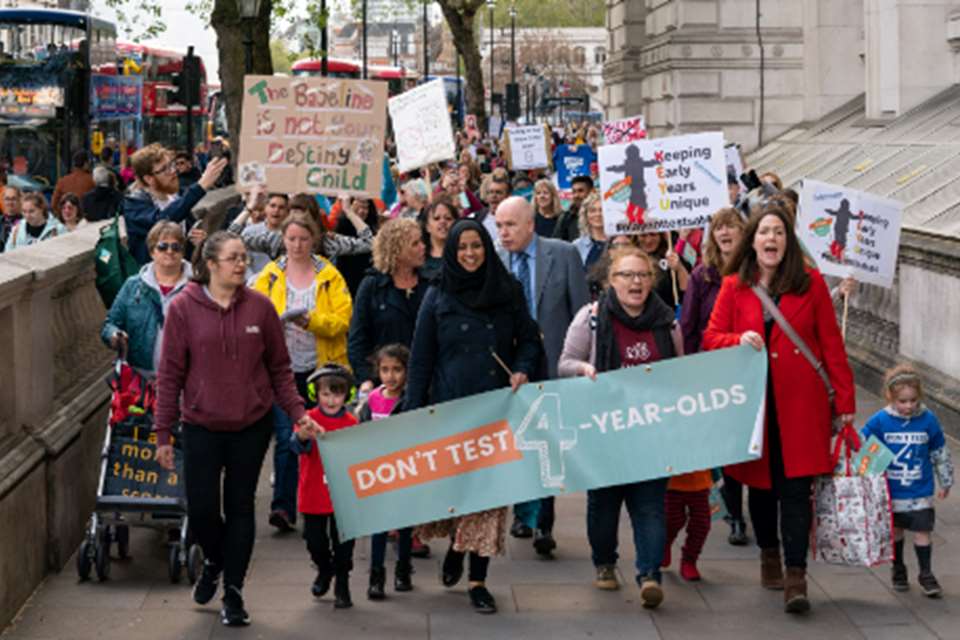EYFS best practice in schools: Baseline – Know better?
Charlotte Goddard
Monday, July 8, 2019
The new baseline assessment programme is being trialled by schools from September. Charlotte Goddard examines what it involves and the concerns surrounding it

Download the PDF of this article
In September, schools all over the country will be opening their doors to the next cohort of four-year-olds ready to start their journey through formal education. It is the same every year, but in 9,612 schools there will be a new element to take into account. These are the schools that have signed up to pilot the Government’s baseline assessment programme.
DEVELOPING BASELINE
The Department for Education has been keen to establish a national baseline assessment process for a number of years. The Government wants to create what it says will be a fairer progress measure for primary schools, by taking a snapshot of children’s abilities when they begin school, and using this as a baseline to measure progress made by Year 6.
Currently, schools are judged on the progress children make between Year 2 SATs and Year 6 SATs, but this does not credit the work that schools do with children between Reception and Year 2. Under the new assessment scheme, Year 2 SATs would no longer take place.
In 2015, nearly 80 per cent of primary schools took part in a pilot scheme, choosing from three different baseline assessment tools. However, an evaluation concluded the three tools were too different to allow comparison, and the project was abandoned. In September 2018, 300 schools piloted a new tool created by the National Foundation for Educational Research. An element measuring children’s ability to self-regulate was dropped as a result of the trial, and the baseline assessment being trialled this September will now measure only literacy and numeracy. After this year’s pilot, the baseline assessment scheme is expected to become mandatory for all schools in September 2020.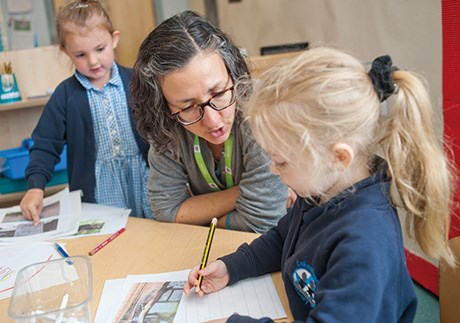
ENTRY AND ONGOING ASSESSMENT
Most schools already set out to establish the starting point of children using a range of sources: teachers’ observations, data gathered from children’s previous settings and input from parents. ‘Teachers want to build a profile of individual children’s needs and the needs of groups of children, and use their knowledge to help inform provision and teaching,’ says Phil Armstrong, head of regional development for London and the South at Early Excellence, which developed Reception baseline tool EExBA. ‘The information gained can also be used to show children’s progression and the impact of teaching.’
The DfE’s baseline assessment is not the same as the entry assessment and ongoing assessment processes that schools already undertake. The Government has said that its scheme is not designed to provide ongoing formative information for practitioners, provide detailed diagnostic information about pupils’ areas for development, or be used to measure performance in the early years, evaluate pre-school settings or hold early years practitioners to account. The assessment only provides information on literacy and numeracy, and schools will not have access to the results for individual children (a raw score out of 45). These statistics will serve no purpose until they are dusted off in the summer of 2027 and compared with the same children’s Year 6 SATs results.
However, despite warning the test has not been designed to provide information about pupils’ areas for development, the DfE recently revealed teachers will receive a series of short statements telling them how their pupils performed in the assessment. ‘These can be used to inform teaching in the first term,’ it said. There are concerns in the early years sector that this move could lead to confusion.
‘There was some criticism from teachers who said, “You are subjecting children to this test, and taking us out of the classroom, for something that will not even help teachers”,’ says Nancy Stewart, vice chair of TACTYC, the association for professional development in early years. ‘So, now they have said they will give these narrative statements about children. On the one hand the Government is saying this is nothing to do with supporting you to understand the child, and on the other it is saying this could be used to inform teaching.’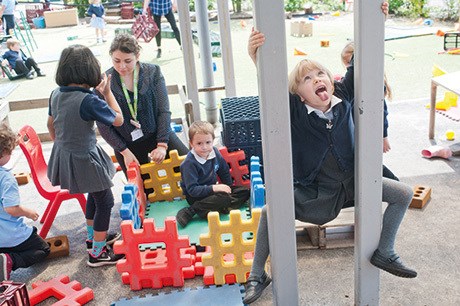
PRACTICALITIES
The baseline assessment will be delivered by a trained Reception teacher, teaching assistant or other professional, in the first six weeks of term. Children will be presented with practical tasks using physical resources, and the practitioner will complete an online scoring system for each child, using a laptop or tablet. The children will be expected to respond by pointing, talking or moving objects, depending on the activity.
Mathematics tasks will cover areas such as addition and subtraction, mathematical language and understanding of shape, while literacy tasks will look at vocabulary, phonics, reading and comprehension. The assessment will be taken by all children, including those for whom English is an additional language and children with SEN. However, children’s response to tasks will affect what other tasks they are presented with, so not all children will take the same path through the assessment. The Government says this approach aims to stop children from becoming upset if they can’t complete an activity. The test is expected to last around 20 minutes for each task.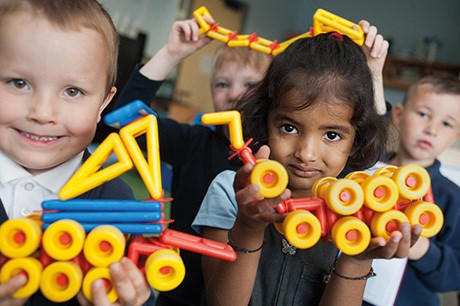
CONCERNS
The education and early years sectors have reacted to the proposed introduction of the baseline assessment with huge concern. The coalition More Than A Score organised a ‘march of the four-year-olds’ to Downing Street in April to present a petition signed by more than 64,000 parents and teachers, calling on the schools minister to ‘cancel this doomed experiment once and for all’.
‘It is not possible to sit a four-year-old down and get a true picture of what they know and understand about maths and language in a 20-minute test,’ says Ms Stewart. Children may choose not to exhibit a skill one day which they can use the next day, especially when they have just started in an unfamiliar environment.
‘They may be able to answer harder questions but not easier ones, but the baseline assessment’s “routing” pathways will not give them that opportunity. They may know something far beyond what they have been asked, but not that step.’
In the past, research has shown school progress measures often lead to unwanted outcomes such as teaching to the test. Andy Richbell, head at St Nicolas CE Primary School in Brighton, believes the baseline assessment has the potential to create such ‘perverse incentives’.
‘Our school does not have a nursery but those that do, especially those in deprived areas, are slogging their guts out to help children become school-ready,’ he says. ‘This will now potentially damage the value the school is shown to add if the Government is comparing children as they enter Reception and as they leave Year 6. Under the Government system, you would want entry data to be as low as possible. Of course, any school with a moral compass would not do that, but effectively, if you do a good job in nursery you are penalising the school.’
Other concerns include:
The test takes teachers away from the classroom and interrupts children’s play at a time which should be devoted to building relationships. A class of 30 children will take at least ten hours to process.
The assessment may cause distress. ‘It says in the guidance if a child needs a break, you can give them a break,’ says early years consultant and part-time assistant head teacher Judith Twani (see case study, below). ‘That says to me this is a potentially stressful situation.’
‘School readiness’ may come to be synonymous with maths and literacy since this is the sole focus.
Children with SEND, those with EAL, younger children and children from disadvantaged backgrounds will be penalised. ‘Research has shown when disadvantaged children were tested they were more likely than middle-class children to say they didn’t know the answer even when they did,’ says Ms Stewart. ‘If an adult gave them supportive help, they felt more confident and gave the answer, but with these tests the adult is not allowed to help them.’
Schools may use the baseline results to group by ability. ‘Teachers may use the narrative statement for setting children in ability groups,’ says Ms Stewart. ‘Research on setting in early years shows it is extremely disadvantageous.’
‘Whatever happens with the DfE, schools are still going to have to do their own robust and accurate baseline, because this is not going to give them the information to help inform their teaching and support children in their learning,’ says Mr Armstrong.
However, teachers are worried that the introduction of the DfE system will impact their current good practice when it comes to transition and assessment, eating into the time they spend observing the children’s play.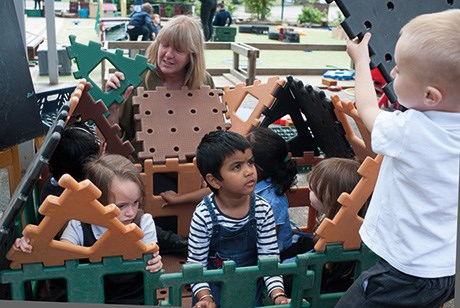
BEST PRACTICE
Best practice in assessing four-year-olds starting Reception should be rooted in the principles of the EYFS, says Melanie Pilcher, policy and standards manager at the Early Years Alliance. ‘Establish their start point by finding out their interests, needs and abilities, talking to parents and nurseries and especially the child’s key person, because they have already built that positive relationship,’ she says.
Training on early years assessment should be a priority, says Ms Stewart. ‘There are people in Reception who have not been trained in child development,’ she says. ‘Rather than wasting £10 million on something so useless, it would be better to invest in good professional development in early assessment.’
It is possible to arrange a structured assessment without sitting children down one to one. ‘Set up something that involves a playful, open-ended activity, and make notes on each child,’ Ms Stewart suggests. ‘We used to have a small group and invite children to draw a picture. Several adults were making notes about pencil grip, scribing what children were saying, asking if they could write their name on their picture – you then have a lot of information from something the children enjoyed.’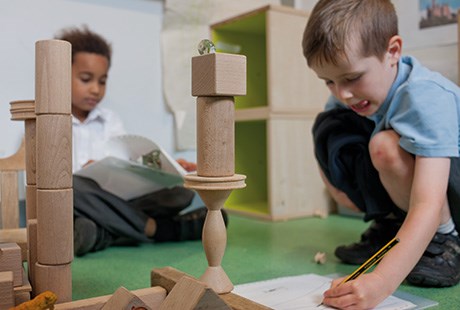
Parents and pre-schools
A top-notch entry assessment process would involve home visits and liaising with early years settings, says Ms Stewart. ‘Some children freeze up and don’t show what they can do once they start school. Listen to the nursery and pre-school, and parents: assessment needs to include all the people who know the child.’
Early years settings should have input into what kind of data schools are asking for, argues Ms Pilcher. ‘Some local authorities have produced guidance which schools and early years providers worked on together: that is very welcome because it helps to ensure consistency,’ she says.
‘There is so much information coming from nurseries to schools which can support teachers with that initial assessment, transition documents and learning journeys, but we have been told again and again that early years practitioners feel that information is not being referred to by the school. It is really frustrating for them because they spend a lot of time collating that information.’
Rebecca Lax is EYFS lead at a London primary school. ‘We have an All About Me pack which asks questions about what children like to do, and what they can do, such as recognise numbers – although we make it clear there is no expectation they will be able to.’
The school carries out a home visit for every child and visits the child’s nursery where possible, although some are near parents’ workplaces so can be some way out of the area. ‘We have to get permission from the parents to contact the settings, and it is not always easy to find out where the children have attended, but nurseries and pre-schools have so much knowledge about the children,’ says Ms Lax.
The school combines information from parents and early years settings with teachers’ own observations in order to create a baseline assessment. ‘In the first few weeks, we put out resources that will interest the children and help assess them in an informal way without calling them over asking them to count for us,’ says Ms Lax. ‘We may have birthday cards with numbers from one to ten, or there will be playdough with cupcake cases, and a child might say, “I have made four.” It is all done through play.’
Ms Lax’s school is not taking part in the baseline trial in September. ‘I am nervous about being one of the only schools in the area not doing it, but I am very keen not to do it until I have to,’ she says.
‘I can’t understand why we as a profession are not kicking up more of a fuss about this,’ says Mr Richbell. ‘It does mean the Year 2 SATs will disappear, but this is such a bad thing to put in their place. We need to challenge the whole accountability system.’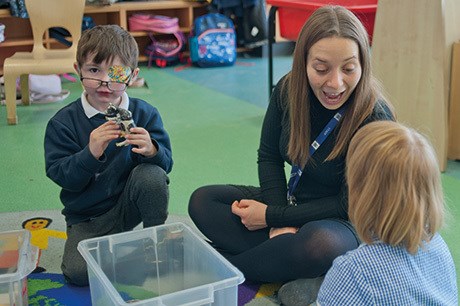
CASE STUDY: Carden Nursery and Primary School, Brighton
Carden’s two Reception classes have a well-established transition and assessment process in place. Head Helen Longton-Howorth fears the introduction of baseline assessment next year will impact on this.
‘It will be carried out at the expense of the other really good practice that gives you such a rich picture of the children,’ she says. ‘The test assumes you have children who are confident and able to verbalise – we have children join us with very poor communication skills.’
The majority of Reception children come from the on-site nursery. ‘We have at least a year of getting a picture of the children before they start Reception,’ explains Ms Longton-Howorth. ‘If children are not in our nursery, Reception staff will visit their setting, and talk to the professionals there, health visitors, anyone involved with the children.’ The nurseries hand over documentation on the children. ‘The quality of this does vary from setting to setting,’ says Ms Longton-Howorth.
Children receive a home visit when they start at the school nursery, while those joining from other settings are visited at home in the summer term. ‘The children really like the fact teacher has made an effort to go to their house and play,’ says Ms Longton-Howorth. Two stay-and-play sessions also allow staff to observe children and talk to parents.
‘The teachers assess children using informal observations and quality interactions between staff and children,’ says Ms Longton-Howorth. ‘We find ways to establish where the children are in different situations and whether their skills are transferable – if they can count books, can they count pegs, for example?’
CASE STUDY: Lakenham Primary School and Nursery, Norfolk
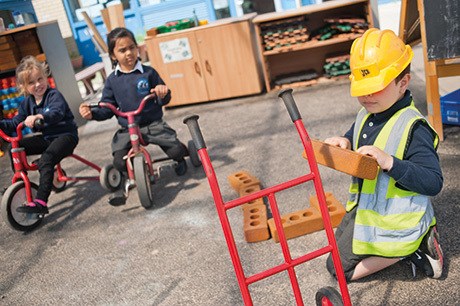
Lakenham’s assistant head teacher Judith Twani (pictured) was involved in moderating Early Excellence’s original pilot baseline (EExBA) in schools across the South. Lakenham now uses Early Excellence’s observation-based Assessment Tracker (EExAT), an ongoing assessment tool which has the facility to set a baseline. Staff took part in three-hour online  training before implementing the system.
training before implementing the system.
‘I have also attended training around data analysis using EExAT,’ says Ms Twani. ‘Webinars and face-to-face training are repeated regularly throughout the year.
‘Staff get to know the children and spend time with them, and note significant learning and development on EExAT, uploading photos and videos as necessary,’ says Ms Twani. ‘There are six monthly milestones based on what is typical for a child of that chronological age. Each statement is exemplified by videos and additional guidance. The programme also includes the Early Learning Goals so children’s progress from their starting points towards achieving these can be seen clearly.’
The assessment tool is based around the seven areas of learning and development with their subsections and includes the Characteristics of Effective Learning. The Leuven scales for well-being and involvement are also integrated into the assessments, and staff are able to use these to judge when children are ready to be assessed.
‘It is better to spend time settling children before you do other assessment,’ says Ms Twani. ‘Some children enter Reception and it is like they were born to be here, and those are the ones we can start to assess quickly. But others find it stressful, and that is why we provide lots of opportunities for them to come in with their parents.’
The school’s nursery also uses the EExAT system, so data gathered at the end of nursery will serve as a baseline for Reception children. Nursery children from the school and from other settings have many opportunities to meet their new teachers, including stay-and-play sessions and home visits.
‘Reception and nursery share the same outdoor area and so are already familiar with the adults,’ says Ms Twani. ‘The nursery children are also able to go into the Reception classrooms during child-initiated times and there will be a number of shared story and song times. Parents will also be able to use EExAT to share home learning with the teachers, and likewise they receive examples of significant learning.’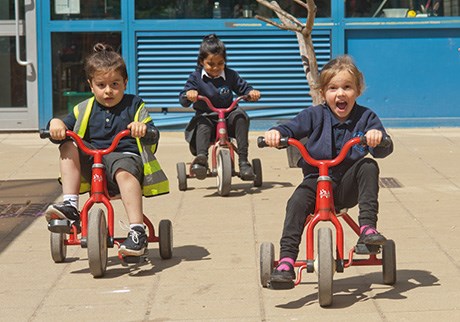
MORE INFORMATION
Young children as guinea pigs: the Reception Baseline Assessment Framework, TACTYC, March 2019, http://imx07wlgmj301rre1jepv8h0-wpengine.netdna-ssl.com/wp-content/uploads/2019/03/Young-children-as-guinea-pigs-TACTYC.pdf
Assessment framework: Reception Baseline Assessment, February 2019. A document specifying the purpose, format, content and cognitive demand of the Government baseline assessment.https://assets.publishing.service.gov.uk/government/uploads/system/uploads/attachment_data/file/781766/Reception_baseline_assessment_framework.pdf
Reception baseline comparability study: Results of the 2015 study, March 2016, https://assets.publishing.service.gov.uk/government/uploads/system/uploads/attachment_data/file/514581/Reception_baseline_comparability_study.pdf
See Nursery World's Big Issue on the Reception Baseline https://www.nurseryworld.co.uk/reception-baseline



